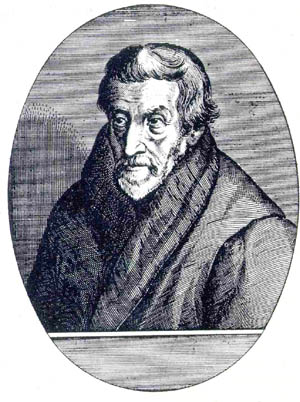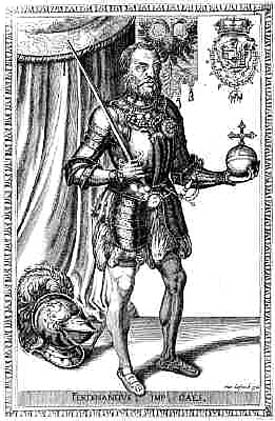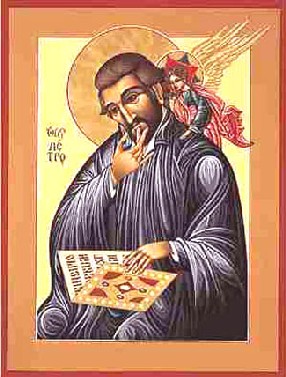 |
The Saint of the Day
St. Peter Canisius – December 21
Prof. Plinio Corrêa de Oliveira
Biographical selection:
St. Peter Canisius (1521-1597), a member of the Society of Jesus, is a Confessor and Doctor of the Church. He led the Counter-Reformation in German lands, wrote a catechism that went through 200 editions in his life, and became known as the Hammer of the Protestants.
 St. Peter Canisius fought Protestantism St. Peter Canisius fought Protestantism
in Germany, Austria, Hungary and Switzerland |
In 1555, Emperor Ferdinand of Austria wrote to St. Peter Canisius this letter about the first part of the catechism he had written:
“Most worthy Father, and dear friend.
“We have read and examined the first part of your catechism. With God’s help, we judge that the publication of such a work will greatly help the eternal salvation of our faithful subjects. We ask, therefore, that you finish it without delay and send us a complete copy of it so that we might have it translated into the German language. After it is published in Latin and German, it will be used to teach the youth in all our schools, to the exclusion of any other. Whosoever will not obey this decree will incur severe penalties and our indignation.
“We order that you include in the margins references to the books and chapters of the texts from Scripture, the Church Fathers and Doctors, as well Canon Law, which you quote with such great erudition throughout the work. This will permit the less instructed masters and people to refer to those originals.
“We have great hope that by this means, those who have fallen into error will be brought back to the bosom of Holy Mother Church, and that many will adhere to the doctrine of your work after examining the original sources you used. You will help thousands of souls and will receive a hundredfold from Almighty God in recompense.
“As a Christian King sincerely concerned about the eternal salvation of our faithful subjects, we will provide with our royal munificence financial compensation for you and your religious society.” Presbourg, March 16, 1553.
*
We also have an excerpt to read from a sermon by St. Peter Canisius about the corruption of the clergy in Germany:
“We have dishonored the altar of God with impure hands and corrupted lips, with our polluted hearts, scandalous lives and enormous abuses. Our sin is all the greater because we insult the [priestly] dignity that was bestowed upon us. Therefore, because of us, the name of God is blasphemed. For such men, there is no honesty in the home, no sobriety at the table, no continence in the bed, no studying from their books, and no devotion in their hearts.”
Comments of Prof. Plinio:
Each of the two texts deserves a commentary.
The first selection presents the position of Emperor Ferdinand of Austria about the dissemination of the Catholic Faith in his Empire.

Emperor Ferdinand I of Austria
|
You can note that in this excerpt the Emperor took some positions influenced by the error of Royalism (or Regalism), that is, an undue interference of the Monarch in Church affairs. He decreed on the use of St. Peter Canisius’ catechism as if he were a spiritual authority. He stated that the royal authority would forbid the distribution of any other catechism in Austria and favor only this one. Then, he gave an order to St. Peter Canisius to reference his quotations in the margins, as if the saint were his functionary.
While it is true that this disagreeable note appears in the letter, there is, notwithstanding, an aspect that is very praiseworthy. It even offers a lesson of virtue for today’s man, who has become accustomed to the massive laicism of our days. In this letter we can see the remarkable desire of a Catholic King to disseminate the true doctrine in his kingdom.
You can see that he received the first part of the catechism, analyzed it, and formed a high judgment of it and of St. Peter Canisius. Then, he ardently desired to spread it everywhere in his kingdom. For this end, he requested that the work be completed as soon as possible. He explained to the Saint the good results he expected from his catechism and also promised to translate it in German. The dissemination of that catechism was a great work of the Counter-Revolution; therefore, the Emperor was doing a great good for the Church.
This particular catechism was important because many other authors who were writing Catholic catechisms were making concessions to the errors of the time, and for this reason had a Protestant flavor. So it was rare, even then, to find a good catechism that was orthodox and simultaneously accessible to the average youth and children. Therefore, you can understand the eagerness of the Emperor to take advantage of this opportunity. The good Catholic Emperor took a position of zeal.
The Emperor wanted to establish St. Peter Canisius’ catechism as the only one because it was his mission to defend the Faith. First, because he was Catholic, but second, because the greatest concern of the public power should be to spread the Catholic Faith. If the Catholic Faith is well taught and disseminated in a kingdom, much good can be expected. If it is poorly taught and spread, no good will come from it, since the entire good comes only from the Holy Catholic Faith.
This fundamental concern is at the heart of the letter, and it is good to see the representative of the highest power on earth so diligent in spreading solid Catholic doctrine.
If you compare his position with that of many powerful statesmen of our time, you will understand how much the whole social order has declined and healthy religious influence has diminished in the contemporary world. In this sense, the letter is edifying.

St. Peter Canisius had the courage
to rebuke the bad German clergy |
The second text is from a sermon of St. Peter Canisius who spoke about the situation of the German clergy of his time.
He spoke in the plural “we” not because he judged himself guilty, but as courtesy to the others. A rule of courtesy says that when one has to reprimand another, instead of saying: “You have this defect,” one should say, “We have this defect.” This “we” is a polite way of saying things, anyone who is not a fool understands this.
It is a way of speaking that reveals his desire not to offend the others, which is an action of politesse, a refined way of exercising the virtues of charity and justice. It reveals the respect we should have for someone we are reprimanding.
He very clearly and tersely pointed out the defects of the clergy of his time. It is always useful to see a saint reproving the clergy, because the normal tendency of Catholic laymen is to take a position of respect, complacence and sympathy toward the clergy. While this tendency is good, what is not good is to close one’s eyes to the truth and reality. Also a layman has the obligation to analyze the defects of the clergy. He should not deny the truth in the name of respect. This is clearly wrong. It is useful to see that the saints did not take this attitude.
St. Peter Canisius said that the clergy was composed of men whose lives were not honest. He said they were not sober at the table or pure in their beds. They had no care for the books in their studies and no devotion in their hearts. What is left? Nothing! It is a very strong reprimand. The saint looked and saw the situation clearly and objectively, and then he spoke with words that forcefully condemned the errors. It is good for us to see the example of a great saint like St. Peter Canisius to show us that we should be fearless of soul and speech in speaking out against the errors of today’s clergy as far as circumstances demand us to do so.
We should ask St. Peter Canisius to give us this grace.


  | | Prof. Plinio Corrêa de Oliveira | |
The Saint of the Day features highlights from the lives of saints based on comments made by the late Prof. Plinio Corrêa de Oliveira. Following the example of St. John Bosco who used to make similar talks for the boys of his College, each evening it was Prof. Plinio’s custom to make a short commentary on the lives of the next day’s saint in a meeting for youth in order to encourage them in the practice of virtue and love for the Catholic Church. TIA thought that its readers could profit from these valuable commentaries.
The texts of both the biographical data and the comments come from personal notes taken by Atila S. Guimarães from 1964 to 1995. Given the fact that the source is a personal notebook, it is possible that at times the biographic notes transcribed here will not rigorously follow the original text read by Prof. Plinio. The commentaries have also been adapted and translated for TIA’s site.
|
Saint of the Day | Home | Books | CDs | Search | Contact Us | Donate

© 2002- Tradition in Action, Inc. All Rights Reserved
|
 |

|